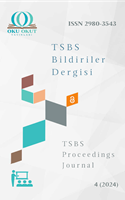DEHB ve Depresyon Arasındaki İlişkide Kişiler Arası Problemlerin Aracılık Etkisi
Mediating Effect of Interpersonal Problems on the Relationship Between ADHD and Depression
Author(s): Aylin Akgyun Bolat, Lisa JonkmanSubject(s): Social psychology and group interaction, Developmental Psychology, Personality Psychology, Behaviorism
Published by: Oku Okut Yayınları
Keywords: Psychology; Adult ADHD; Depression; Interpersonal Relationship Problems; Mediating Effect;
Summary/Abstract: This study aims to examine the relationship between symptoms of Attention Deficit Hyperactivity Disorder (DEHB) and depression in adults, as well as the impact of interpersonal problems on this relationship. Data were collected from 147 adult participants through self-report via online surveys. Participants assessed their DEHB symptoms (hyperactivity, impulsivity, and inattention) using the BAARS-IV scale, while depression symptoms were evaluated using the depression subscale of the DASS-21 scale. Interpersonal relationship problems were measured using the assertive/needy and easily exploited subscales of the IIP-C-IRT scale. The analysis results showed statistically significant and positive correlations between all areas of DEHB symptoms and depression scores. In other words, as DEHB symptoms increased, depression symptoms also tended to increase. Additionally, significant positive relationships were found between DEHB symptoms and both types of interpersonal problems (assertive/needy and easily exploited behaviors). This suggests that individuals with DEHB symptoms are more likely to experience difficulties in interpersonal relationships. However, mediation analyses revealed that assertive/needy or easily exploited behaviors did not have significant indirect effects on the relationship between DEHB and depression. That is, these interpersonal problems do not significantly influence the relationship between DEHB and depression. These findings highlight that depression is common among adults with DEHB symptoms and that there is a strong positive relationship between DEHB and depression. Moreover, they suggest that the role of interpersonal factors in this relationship is limited. The study underscores the necessity of comprehensive treatment approaches that address both DEHB symptoms and the interpersonal difficulties experienced by these individuals. These results provide a deeper understanding of the comorbidity between DEHB and depression and offer important insights for future treatment planning.
Journal: TSBS Bildiriler Dergisi
- Issue Year: 2024
- Issue No: 4
- Page Range: 89-105
- Page Count: 17
- Language: Turkish

